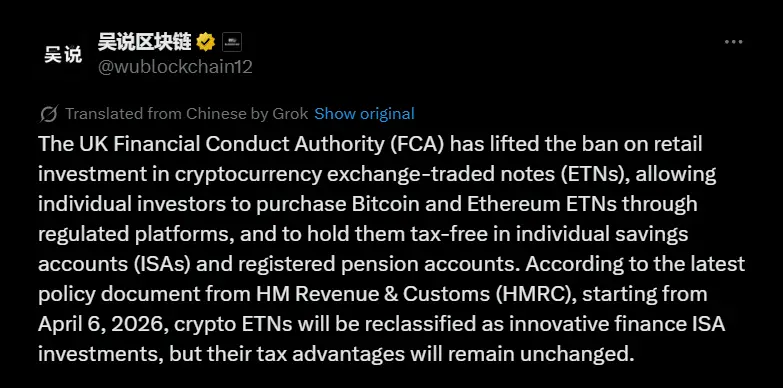Key Highlights:
- FCA lifts ban from exchange-traded notes (ETNs).
- From April 2026, crypto ETNs will be considered as innovative finance ISA investments.
- This policy supports the UK’s goal to be a “global crypto hub.”
The UK Financial Conduct Authority (FCA) has now lifted its ban on retail investment in cryptocurrency exchange-traded notes (ETNs). This move will be a stepping stone in integrating digital assets into mainstream finance. Individual investors can now buy Bitcoin and Ethereum ETNs on regulated platforms and importantly, hold them without having to pay taxes within Individual Savings Accounts (ISAs) and registered pensions.
This announcement was made along with guidance from HM Revenue and Customs (HMRC), the move ends five years of prohibition. From April 6, 2026, crypto ETNs will qualify as ‘innovative finance ISA” investments. This classification requires certain compliance rules but keeps their tax-free status, putting them on the same level as other investment products like corporate bond ETNs and peer-to-peer lending.

Background: A Ban Rooted Risk Concerns
The FCA had put a ban on the ETNs and its derivatives in January 2020. At that time, the regulators were worried over the “intrinsic volatility of crypto assets,” citing that the retail consumers lacked experience and understanding necessary to evaluate high-risk, complex financial instruments that are tied to unregulated digital markets. According to the regulators, sudden swings in the prices of the tokens like Bitcoin and Ethereum could expose investors to severe losses which was one of the highlighted points by the FCA.
Other factors such as market abuse and cyber risk due to poor transparency and unregulated trading venues, insufficient consumer protection and lack of course of action in case of losses, and potential for manipulation in underlying spot markets without established price discovery mechanisms were also highlighted by the regulatory body.
At that time all these concerns were valid and they also aligned with a wave of caution from regulators around the world, which also includes the U.S. Securities and Exchange Commission (SEC) and the European Securities and Market Authority (ESMA), both of which had raised similar concerns around retail crypto exposure.
Why the FCA Changed Course?
The current reversal shows how the market has changed over the years. Bitcoin and Ethereum are now seen as trusted investments that are supported by regulated, transparent exchange-traded products. In the UK, several institutional ETNs already trade on the London Stock Exchange, though they were only open to professional and accredited investors until now. Since 2021, European Union markets have also adopted crypto ETPs under clear rules on custody and disclosure.
In the updated policy notes, the FCA has stated that since the market has matured, there are better disclosure standards, and stronger custody practices exist, it is now acceptable to let retail investors take part in a controlled way. This also allows the UK to be in line with the EU and the U.S., where crypto ETFs are now common in retail portfolios.
The UK wants to be a “global hub for crypto,” a plan that was first set out in 2022. The Treasury and HMRC are now clearly pushing towards clear rules that link finance and digital assets, focusing on choice and accountability over bans.
Tax and Regulatory Clarity Ahead
HMRC’s new ruling will give investors more clarity. As mentioned above, from April 2026 Bitcoin and Ethereum ETNs will qualify as innovative finance ISA products, which means that any gains or income from them will not be taxed. This change also sets clear rules for how ETN issuers and brokers handle these products under ISA and pension schemes.
However, the FCA still warns that crypto ETNs are high risk investments. UK investors will now be able to take part in the digital asset economy under clear and transparent rules.
Also Read: Solana Daily Transaction Volume Crashes 50% Despite Bullish Rally.


